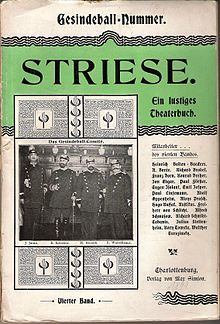Servant ball
Servants ball is arisen in the late 19th century form of the costume ball , the participants, dressed as a maid cooks porters etc.
Emergence
The reason for the creation of the servants' balls was a police ordinance of 1885 , by which the actors were required to keep service books. In the "Regulations on the business operations of the tradespeople listed in Section 35 (2) and (3) of the Reichsgewerbe-Ordinance", a few things are first announced about the books of the second-hand trade, then under Sections 11 and 12 the landlords are required to set up lists of assigned positions that had to be delivered to the police in the evening. The theater agents who placed actors on the stage were now also affected by these provisions , and the stage performers were classified as servants to be placed and obliged to keep a servants' register in which all engagements had to be entered. The outrage over this bureaucratic mistake was great and sparked off at the servants 'balls that were soon held, in which mostly actors and theater people in servants' disguise took part. A contemporary report reports:
“The idea was pretty, and last year's first servants 'ball, at which everyone had to appear in servants' attire, was also very well executed. But this time, with a few exceptions, the better society stayed away, and instead a mass of those little ladies had gathered who had managed the trick of paying a hundred marks a month to pay for a toilet budget of thousands with a hundred marks a month. It was a strange picture. In its external appearance it is pretty, graceful and colorful, but in its entirety only slightly different from the masked redoubts in the winter garden and in the Linden Theater. "
In later years the term servants' ball was also used for unspecific costume parties.
literature
Julius Stinde's parodistic gossip novel Emma, the mysterious housemaid , was written with reference to these circumstances and was initially sold in the form of gossip books at the first servants' balls. The proceeds from the sale went to Wilhelm Raabe , whose financial situation was difficult at the time.
Another work with reference to the servants' balls is the very latest dream book published by Emil Jacobsen for house officers, including those who were or want to become one. . . . according to the most well-tried traditions. . . ed. by Hunold Müller von der Havel (d. i. Emil Jacobsen). Berlin: Freund & Jeckel 1898.
In 1899, the fourth volume of the humorous theater magazine Striese appeared as a servant ball number with relevant content.
Individual evidence
- ^ 1. Extra supplement to the 15th issue of the Official Gazette of the Royal Government of Potsdam and the City of Berlin . Issued April 10th, 1885.
- ↑ Fedor von Zobeltitz : Chronicle of the society under the last empire , Hamburg 1922, 1st volume, page 108f.

